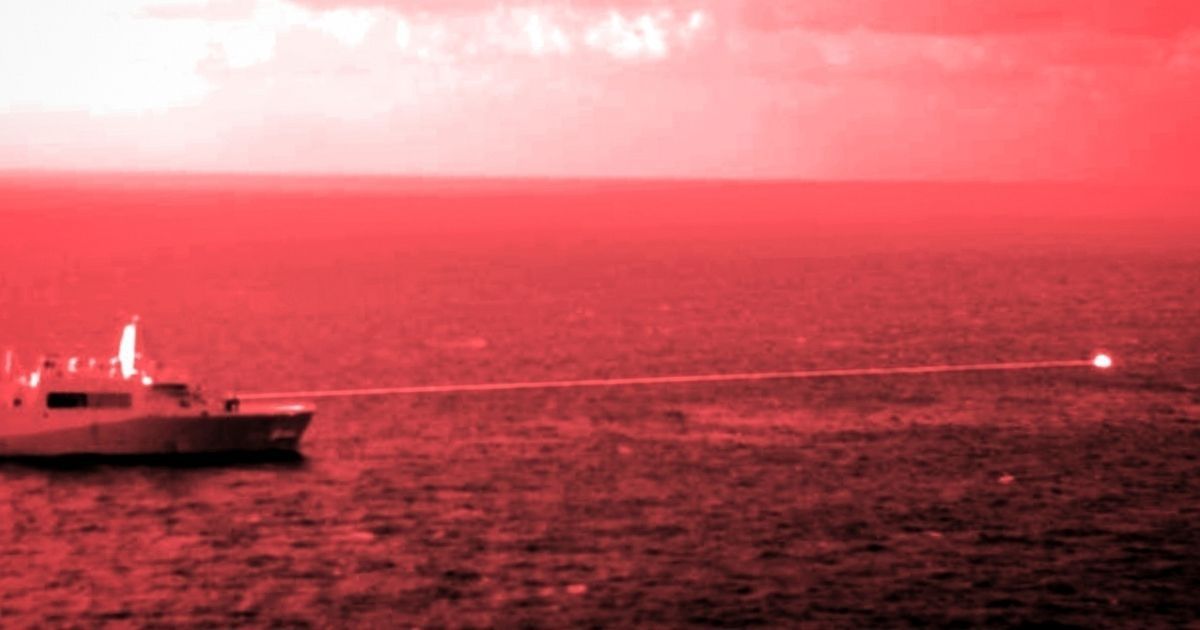The Navy tested a high-energy laser weapon system Tuesday in the Gulf of Aden near Yemen.
Photos released by Naval Forces Central Command showed the sea glowing red as if it were filled with blood while the laser weapon took out a static surface training target.
The Navy had mounted the Solid-State Laser-Technology Maturation Laser Weapons System Demonstrator Mark 2 MOD 0 on the amphibious transport dock ship USS Portland for the demonstration.
The test wasn’t the Portland’s first. The ship used the LWSD in a May 2020 Pacific Ocean demonstration in which it disabled a drone.
— U.S. Pacific Fleet (@USPacificFleet) May 22, 2020
Laser weapons once used to be the stuff of science fiction films and novels.
However, with rapid scientific progress in the last few decades, several countries — including Israel, Russia and China — have developed or are seeking to develop their own laser weapons to combat the threats of the 21st century.
The South China Morning Post reported in 2018 that China had developed a 15mm-caliber portable laser rifle with a range of half a mile, the ZKZM-500.
It said the laser assault rifle could produce an invisible beam that could penetrate windows and result in “instant carbonization” of the target’s skin and tissues.
In 2020, the Navy said China’s People’s Liberation Army had attacked a U.S. P-8 surveillance aircraft with a high-grade laser weapon, leading to a formal protest from the United States, CNN reported.
The United States has long been testing, developing and looking for ways to implement laser weapons in its arsenal.
Defense contractor Lockheed Martin says it has developed laser technology capable of tackling “small rockets, artillery shells and mortars, small unmanned aerial vehicles, small attack boats and lightweight ground vehicles that are approximately a mile way.”
[firefly_embed]
[/firefly_embed]
The company is working on different laser-based technologies to improve the nation’s defense infrastructure.
One such technology is the High Energy Laser with Integrated Optical-dazzler and Surveillance system for naval warfare.
HELIOS, according to an infographic from the defense contractor, will have a 60-plus-kilowatt high-energy laser for inshore attack crafts, along with long-range surveillance capabilities.
It also will have an unmanned-aircraft-system dazzler — a laser weapon capable of temporarily disabling a target.
The laser weapon the Navy tested Tuesday has more firepower than the 30-kilowatt laser weapon, also known as LaWS, that the Navy tested aboard the USS Ponce in the 5th Fleet area of responsibility, Business Insider reported.
[firefly_embed]
[/firefly_embed]
The weapon would come in handy in a great power conflict and in securing the seas from threats such as Iran-backed militias or Iranian naval aggression in the Persian Gulf.
With the rise of China, having an edge in laser weapons would prove beneficial, if not crucial, for the United States to defend its allies in the South China Sea.
This article appeared originally on The Western Journal.

























 Continue with Google
Continue with Google